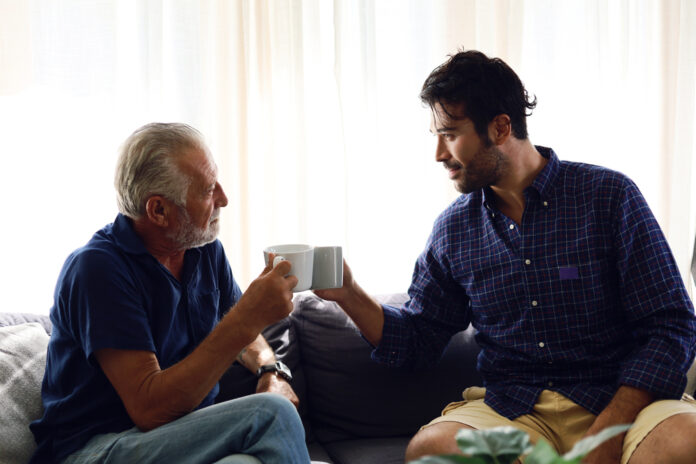Caregiving during the holidays? Surprisingly, this may be the best time to focus on self-care and tune into how you handle stress.
Holiday coping skills can help you to successfully deal with frustrating aspects of festivities, from disapproving relatives to disrupted routines. Read on for holiday self-care tips, including ideas for slowing down and savoring the season.
Challenges of Caregiving During the Holidays
The holiday season can bring stress unique to that time of the year. Care during the holidays can come with added pressures, and caregivers may feel the eyes of visiting family and friends upon them. Difficult family relationships can make you feel like you’re not doing a good job, even when you know you’re doing your best to comfort and care for a loved one.
If you’re a professional caregiver, juggling work responsibilities with many parties and events can be challenging. It can also be hard to spend the holidays apart from the family or individual you care for, especially if you’re worried about how their care will be handled.
In any case, there are many ways to make stress around the holidays more manageable. Your worries and anxieties may not disappear completely, savoring the small moments of the season and coping in a healthy way can help.
Comfort of Marking the Holidays as a Caregiver
For many people, the holidays bring an air of lightness and a feeling of joy, making difficult situations easier to handle. Additionally, holiday decorations are all around, which can make a big difference in the environment. The general excitement of the season can make mundane tasks seem more magical and meaningful.
The holidays can be crucial for creating lasting memories and offer a break from the norm. For caregivers, this can provide a sense of comfort, knowing your loved one may benefit from the joy of the holidays, too.
Holiday Coping Skills
Feeling stressed? One of the best things you can do for yourself during the holiday season is to learn to cope with stress in healthy ways, as opposed to unhealthy ways (such as excessive drinking or overeating).
Adapting to stress, instead of letting the overwhelming feelings take over, can be a helpful way to handle the holidays.
Take a Deep Breath
When you’re starting to feel overwhelmed, the simple act of breathing can make a big difference. Deep breathing helps bring a fresh influx of oxygen into the body. This can act as a “reset” button that clarifies thinking and encourages a feeling of calm.
Although there are some steps you can take to avoid situations where criticisms about your caregiving may come up, breathing can be a backup plan to help you reach a healthy place before you respond.
Adjust Expectations
Instead of planning the “perfect holiday,” look for meaningful ways to connect and celebrate. Even the best-laid plans can get complicated or chaotic when managing multiple people’s needs. It’s okay to keep holiday preparations simple or start new traditions better suited to your elderly loved one. For example, a small meal with close family members or friends can be just as meaningful as a large gathering (but require less effort).
During the holidays, it can be helpful to consider switching from home-making every meal to ordering holiday meals, and there’s no shame in that! Alternatively, try hosting a potluck where attendees can each bring a dish or two.
Your loved one may be unable to participate in all activities, or some activities may be unsafe for them (like ice skating). It’s important to discuss and set priorities beforehand according to what seems important to you so that you can prepare adequately to support them in holiday festivities. It’s also okay to tell people you have a lot on your plate and can’t be super involved in every event.
In other words, you don’t have to feel pressured to show up to everything, even if you’ve been host extraordinaire in the past. Remind yourself often that you’re not obligated to meet the expectations of family, friends, or relatives. You may need to simplify the holidays to make them more manageable this year.
Keep a Regular Routine
Keeping your regular routine around the holidays can be challenging, but sticking to it as closely as you can may have some benefits. Especially if you’re caring for someone with memory loss or physical disabilities, a change in routine can cause significant changes to your care.
Try structuring holiday events around or between your regular mealtimes and other activities whenever possible.
Involve Other Family Members
A visiting friend or family member may be able to lend a hand over the holidays. As the saying goes, “Many hands make light work!” Involving others to help care for your loved one can serve as a reprieve.
Since many more people than usual may be coming to visit your senior during the holidays, consider having visitors come one at a time or in small groups. Crowds can overwhelm you, which may zap your senior’s energy, so it’s essential to gauge what they might be up for before scheduling visitors.
If you don’t have family nearby, connecting with other caregivers online, such as in a support group can be helpful. This can give you ideas on handling care over the holidays when you don’t have family nearby but need some time.
Holiday Self-Care Tips
Self-care means a lot of different things to a lot of different people. Generally, it describes meaningful and intentional practices designed to care for yourself. These measures are often linked with overall health, well-being, and quality of life.
Schedule Time for Yourself
Especially if you’re a full-time or family caregiver, selflessly schedule time for yourself around the holidays. Keeping the magic alive can come at a personal cost, and you deserve time to recharge.
Spend time on your own if that’s what refuels you. Or, schedule a spa day, movie night, or brunch with friends if you recharge by spending time with others.
Set Boundaries Around Buying Gifts
Buying gifts for everyone on your list can be expensive and exhausting. To help with this aspect of the holidays, outline clear expectations for friends and family to follow. Doing so can let others know what to expect from you and lets you know what to expect from them. Deciding this ahead of time can help both parties to avoid hurt feelings or misunderstandings.
Consider the following ideas when it comes to gifting this year:
- Ask for acts of service or donations instead of presents
- Assign names or set up a rotating list for large families (so no one is left out, but you don’t have to worry about buying everyone an individual gift.
- Request or give gift cards to help standardize gift-giving
- Utilize a name-drawing or registry website to make present preferences clear
Engage In Holiday Activities & Hobbies
It may sound simple, but one of the best self-care practices is to enjoy the holidays. Don’t let them pass by! Taking part in your favorite traditions can make you feel more like yourself during this time of year.
Even a short walk around the neighborhood to look at holiday lights or take a few minutes to bake cookies can give you time to recharge. You may find it more meaningful to spend your small amount of spare time on a hobby (instead of something holiday-related) and that’s okay, too.
Caregiving During the Holidays: Final Takeaways
Due to changing routines and added pressures, the holidays can be a hard time for caregivers to keep up. Festivities can become especially complicated with added expectations from family and friends.
Fortunately, a few simple measures—like deep breathing and setting boundaries beforehand—can help make caregiving around the holidays a lot more manageable.
References:
Bursack CB. Caregiving During the Holidays: Have a Realistic, Positive Approach. Agingcare.com. Accessed November 2023.
Goyer A. 10 Tips for Caregivers During the Holidays. Aarp.org. Published November 2018.
National Institute on Aging. Holiday Hints for Alzhiemer’s Caregivers. Nia.nih.gov. Published May 2017.






